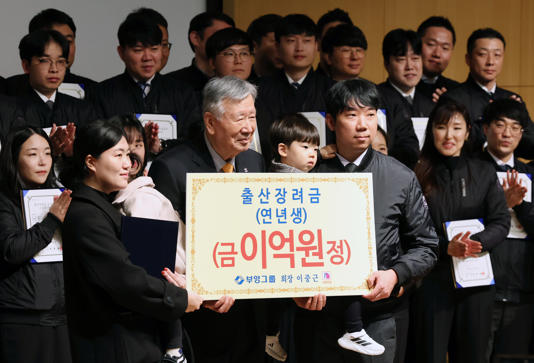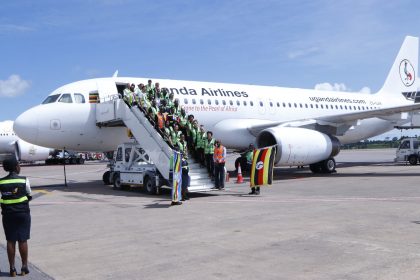South Korean conglomerate gives employees UGX 288 million incentive to have children
 Booyoung Group Chairman Lee Joong-keun poses after giving birth incentives to a family with multiple children during a New Year ceremony at the Booyoung Building in Jung-gu, Seoul, on Feb. 5, 2024. /Yonhap News
Booyoung Group Chairman Lee Joong-keun poses after giving birth incentives to a family with multiple children during a New Year ceremony at the Booyoung Building in Jung-gu, Seoul, on Feb. 5, 2024. /Yonhap News
Story by Shin Su-ji, Kim Seo-young
A South Korean business conglomerate on Monday paid out nearly USD 5.3 million to 70 employees who had conceived children during the past 3 years. The South Korean daily CHOSUNILBO reported that Booyoung Group, a business conglomerate with interests spanning the banking, construction and hospitality sectors, has introduced the ground-breaking initiative as part of efforts to address South Koreas declining birth rates by offering a 100 million won (USD 75,326 – UGX 288,246,011) incentive per child born to its employees, becoming the first South Korean company to do so. The company has also proposed providing national housing scale permanent rental homes to employees with a third child, contingent on the government allowing private sector involvement in the permanent rental housing market.
Booyoung Group Chairman Lee Joong-keun awarded a total of 7 billion won (USD 5, 273,784.60- UGX 20.2 billion) in childbirth incentives to employees, 100 million won each to 70 children born since 2021, at a New Year ceremony at the company headquarters in Seoul on Feb. 5. “In addition to the government’s efforts, our company decided to ease the financial burden of raising children, which is considered the biggest cause of the low birth rate problem, and to support employees to balance work and family directly.” Lee said.
The company plans to continue providing 100 million won for each child born to its employees. “I was worried before and after giving birth about how difficult it is to raise a child financially, but thanks to Booyoung Group’s extraordinary support, I can now plan for a second child,” said Son Jeong-hyun, a staff member who gave birth to a child on Jan. 3 this year. “I am grateful to the company for being so supportive.”
Lee suggested a policy for tax-exempt donations toward childbirth incentives to solve the low birth rate issue, allowing for income tax deductions for donors. He proposed that individuals or corporations donate up to 100 million won per baby born after 2021, and that both individual and corporate donation amounts be eligible for income tax deductions at the year-end settlement. “If such a system is supported, not only the government but also individuals and companies could voluntarily participate and overcome the low birth rate crisis, similar to the past ‘gold collecting campaign,’” Lee said.
Credit to: www.msn.com

 Brussels Airlines to announce Nairobi service
Brussels Airlines to announce Nairobi service
 SITA promises enhanced travel experience after Materna acquisition
SITA promises enhanced travel experience after Materna acquisition
 Saudia’s 105 aircraft order stretches A320neo lead over rival Max
Saudia’s 105 aircraft order stretches A320neo lead over rival Max
 Boeing refuses to pay hackers $200 million for stolen Data
Boeing refuses to pay hackers $200 million for stolen Data
 Uganda-Tanzania announce date for second joint business forum
Uganda-Tanzania announce date for second joint business forum
 Uganda Airlines leased A320 arrives in Entebbe
Uganda Airlines leased A320 arrives in Entebbe
